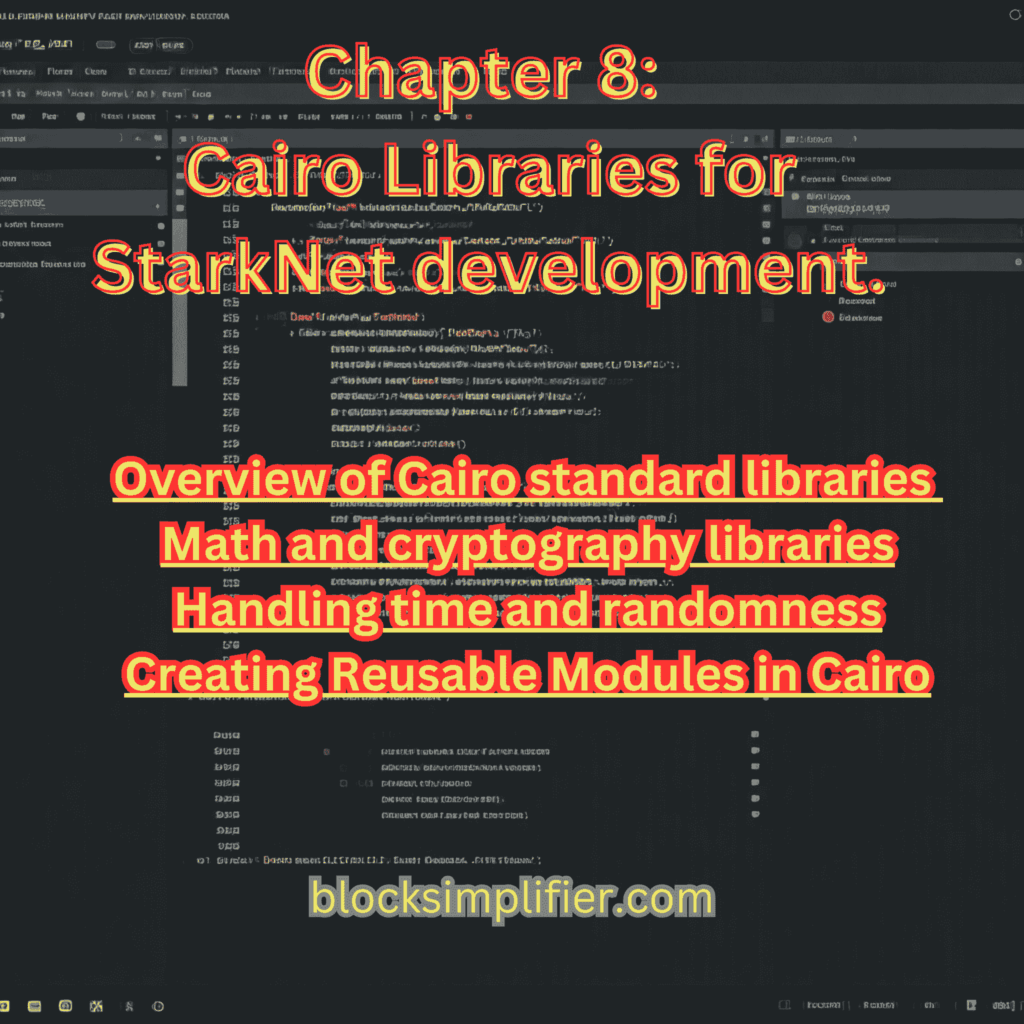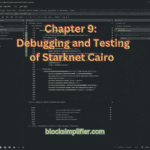Cairo is a programming language used for developing zero-knowledge proof-based smart contracts, particularly for the StarkNet blockchain. Its libraries are vital for efficient, secure, and reusable code. This guide explores Cairo’s standard libraries, math and cryptography tools, handling time and randomness, and creating reusable modules.
Table of Contents
Overview of Cairo standard libraries
The Cairo standard libraries are a collection of pre-written and well-tested Cairo code modules that provide essential functionalities for developing StarkNet smart contracts. These libraries offer quite a number tools and utilities, significantly improving developer productivity and code first-class.
Key Features and Benefits:
- Efficiency: Standard libraries are optimized for performance and gas efficiency on the StarkNet network.
- Security: They are rigorously audited and tested to minimize security vulnerabilities.
- Reusability: By utilising fashionable libraries, developers can avoid redundant code and awareness on constructing precise software logic.
- Maintainability: Standard libraries regularly adhere to high-quality practices and coding conventions, improving code readability and maintainability.
Core Components of the Cairo Standard Libraries:
- Math Libraries:
- Arithmetic Operations: Efficient implementations of arithmetic operations like addition, subtraction, multiplication, division, and modular mathematics.
- Cryptography: Functions for cryptographic primitives consisting of hashing, elliptic curve operations, and wide variety theory.
- Data Structures:
- Arrays: Efficient implementations of arrays and dynamic arrays for storing collections of data.
- Maps: Implementations of key-value maps for efficient data lookups.
- Sets: Implementations of sets for storing unique elements.
- StarkNet Interaction:
- Account Abstraction: Utilities for interacting with StarkNet’s account abstraction features, such as social recovery and multi-signature wallets.
- Event Handling: Functions for emitting and subscribing to events within StarkNet contracts.
- Contract Interactions: Tools for efficiently calling functions in other StarkNet contracts.
- Testing Libraries:
- Assertion Frameworks: Libraries for writing unit tests and integration tests to ensure the correctness and reliability of your Cairo contracts.
- Mock Objects: Tools for creating mock objects to simulate the behavior of other contracts during testing.
Using Cairo Standard Libraries:
- Import: Import the required functions or modules from the standard library into your Cairo contract.
- Utilize: Use the provided functions and data structures within your contract’s logic.
Example:
Code snippet
from starkware.cairo.common.math import assert_le
fn check_value(value: felt) {
assert_le(value, 100); # Asserts that 'value' is much less than or identical to 100
}
Math and cryptography in cairo libraries
Math Libraries
- Arithmetic Operations:
- Efficient Implementations: Provide particularly optimized implementations for essential arithmetic operations like addition, subtraction, multiplication, division, modular mathematics, and greater.
- Benefits: Enhance overall performance and decrease gasoline costs by using leveraging optimized algorithms.
- Example:
starkware.cairo.common.mathlibrary offers functions likeassert_le(assert less than or equal to),unsigned_div_rem(unsigned division with remainder), andpow(exponentiation).
- Number Theory:
- Prime Field Arithmetic: Implementations for operations within a prime field, crucial for many cryptographic algorithms.
- Modular Exponentiation: Efficient algorithms for calculating modular exponentiations, a cornerstone of many cryptographic protocols.
Cryptography Libraries
- Hashing:
- Secure Hash Functions: Implementations of cryptographic hash capabilities like SHA-256 and Pedersen hashes.
- Applications: Used for information integrity tests, generating unique identifiers, and building Merkle Trees.
- Elliptic Curve Cryptography (ECC):
- Curve Operations: Implementations of factor addition, scalar multiplication, and different operations on elliptic curves.
- Applications: Used in virtual signatures, key change protocols, and 0-expertise proofs.
- Zero-Knowledge Proof Systems:
- Building Blocks: Provide constructing blocks for constructing zero-understanding proofs, together with Pedersen commitments and range proofs.
- Applications: Enable privacy-preserving applications and stable computations.
Example: Using the assert_le function from starkware.cairo.common.math
Code snippet
from starkware.cairo.common.math import assert_le
fn check_value(value: felt) {
assert_le(value, 100); # Asserts that 'fee' is much less than or same to a hundred
}
Benefits of Using Math and Cryptography Libraries
- Security: Leverage well-vetted and audited implementations, reducing the risk of introducing vulnerabilities.
- Efficiency: Benefit from optimized algorithms and records systems for improved performance.
- Readability: Improve code readability and maintainability with the aid of using concise and well-documented library functions.
- Reduced Development Time: Avoid the need to put into effect complicated mathematical and cryptographic algorithms from scratch.
Handling time and randomness
Handling Time in StarkNet
- Challenges:
- Deterministic Execution: StarkNet’s middle principle is deterministic execution. This way that given the identical inputs, a settlement have to usually produce the equal outputs. This makes it tough to include time-dependent common sense immediately.
- Block Timestamps: While StarkNet provides a block timestamp, it’s not always reliable for precise time-sensitive applications due to potential block time variations.
- Approaches:
- Block Numbers: Use block numbers as a relative measure of time within the StarkNet context. This provides a more reliable indicator of the passage of time compared to timestamps.
- External Oracles: Integrate with external oracles that provide verifiable timestamps or other time-related data. These oracles can be used to introduce time-sensitive logic into your contracts.
- Delayed Execution: Implement mechanisms for delayed execution, such as time locks or scheduling mechanisms.
Handling Randomness in StarkNet
- Challenges:
- Determinism: True randomness is inherently non-deterministic, which can be tough to acquire inside a deterministic execution surroundings like StarkNet.
- Approaches:
- Verifiable Random Functions (VRFs): Utilize VRFs to generate unpredictable outputs that can be established on-chain. This provides a stable and verifiable source of randomness.
- External Randomness Beacons: Integrate with external randomness beacons that offer verifiable and unpredictable random numbers.
- Hashing: Use cryptographic hash features to generate pseudorandom numbers primarily based on unpredictable inputs, including block hashes or user-furnished seeds.
Important Considerations:
- Security: Carefully evaluate the security implications of any time-related or randomness-related logic within your StarkNet contracts.
- Gas Costs: Be mindful of the gas costs associated with interacting with external oracles or implementing complex randomness mechanisms.
- Usability: Design your contracts to be user-friendly and avoid introducing unnecessary complexity due to time or randomness considerations.
Creating Reusable Modules in Cairo
1. Define a Module
Create a Separate File: Create a new Cairo file (e.g., my_module.cairo) to encapsulate the reusable logic.
Use mod Keyword: Define a module using the mod keyword:
mod my_module {
// … your functions and data structures here …
}2. Define Public Interfaces
Use pub Keyword: Make functions, structs, and other elements accessible outside the module using the pub keyword.
mod my_module {
pub fn add(a: felt, b: felt) -> felt {
return a + b;
}
pub struct Point {
x: felt,
y: felt,
}
}3. Import and Use in Other Contracts
Import the Module: Import the module into your main contract:
from .my_module import add;
#[starknet::contract]
mod my_contract {
// …
fn some_function(a: felt, b: felt) {
let sum = add(a, b);
// …
}
}Example: A Simple Math Module
Code snippet
mod math_utils {
pub fn add(a: felt, b: felt) -> felt {
return a + b;
}
pub fn subtract(a: felt, b: felt) -> felt {
return a - b;
}
pub fn multiply(a: felt, b: felt) -> felt {
return a * b;
}
}
Best Practices
- Clear Naming: Use descriptive names for modules and their components.
- Documentation: Document your modules clearly and concisely using comments.
- Testing: Thoroughly take a look at your modules to make sure they function successfully and reliably.
- Maintainability: Keep your modules nicely-prepared and clean to preserve.
Benefits of Using Modules
- Improved Code Organization: Enhances code clarity and maintainability.
- Increased Reusability: Reduces code duplication and promotes code reuse.
- Simplified Maintenance: Makes it simpler to update and maintain code.
- Enhanced Modularity: Allows for better code organisation and
FAQ
- What are the main advantages of Cairo’s libraries?
- They simplify development, ensure security, and optimize performance for zk-based applications.
- How do I include a Cairo library in my project?
- Use the
importkeyword. For example,import math from cairo_std.
- Use the
- Can I create custom libraries?
- Yes, Cairo allows custom modules to be created and imported. Use namespaces and proper function scoping for best practices.
- How does randomness differ in Cairo compared to other programming languages?
- Cairo’s randomness mechanisms are deterministic, relying on cryptographic methods rather than traditional random number generators.
- Where can I find official documentation for Cairo libraries?
- Visit the StarkNet documentation site for detailed guidance.




Pingback: Chapter 9: Debugging and Testing in Cairo - BlockSimplifier